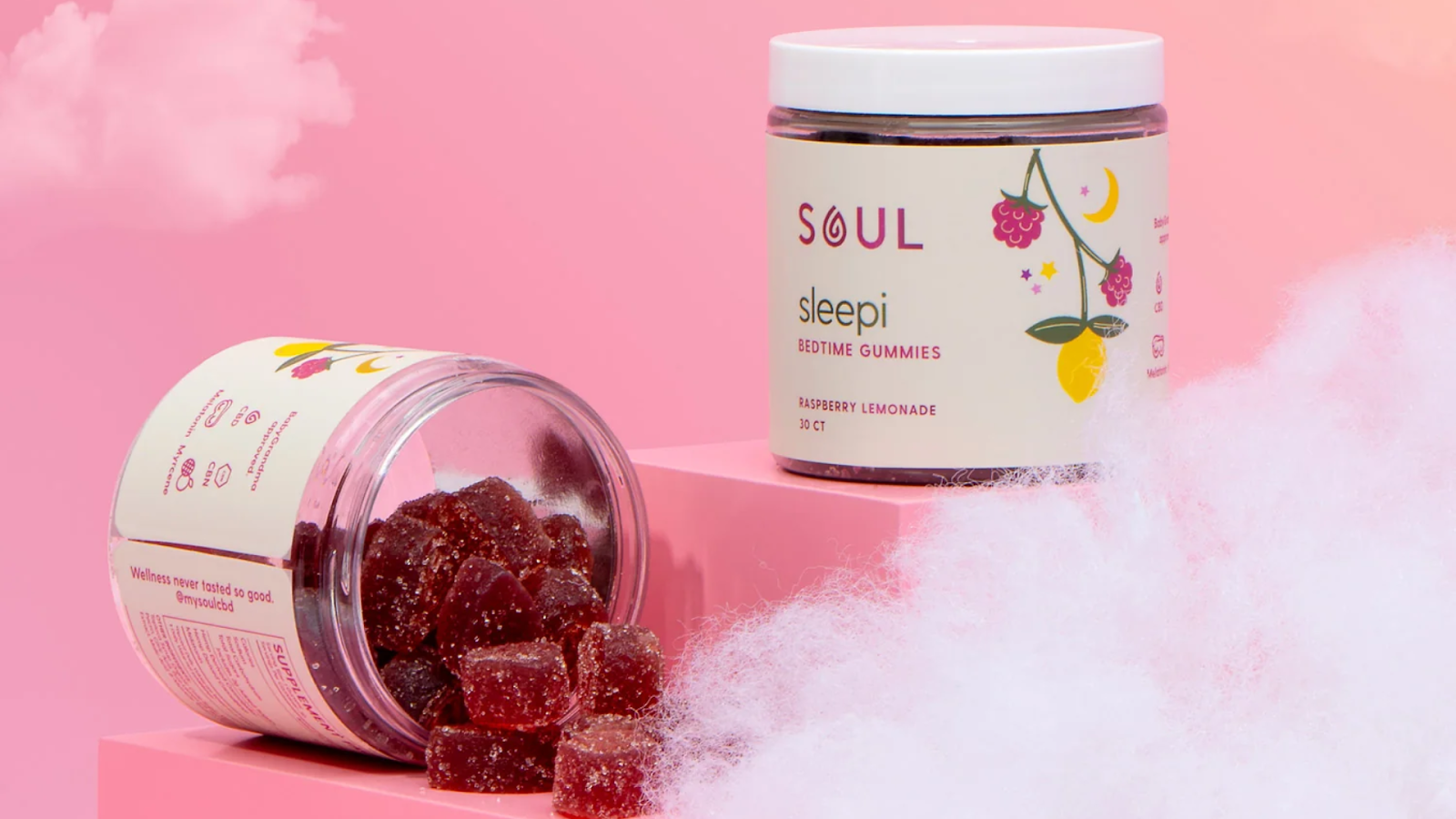Key Takeaways:
- CBD may improve sleep by interacting with the body's endocannabinoid system, addressing underlying causes of insomnia such as anxiety and pain without the psychoactive effects of THC.
- Early research points to CBD's potential as a sleep aid, but ongoing studies are essential for understanding its full benefits and long-term effects.
- CBD is often seen as a safe supplement with minimal side effects, though its legal status can differ from one place to another. For those considering it, especially for sleep issues, it's crucial to opt for high-quality products. Consulting a healthcare professional before beginning any new supplement, including CBD, is advisable.
In recent years, Cannabidiol (CBD), a naturally occurring compound found in the cannabis plant, has surged in popularity as a potential remedy for a wide array of health conditions. Among its many applications, CBD's role in managing insomnia and improving sleep quality has attracted significant interest from researchers and consumers alike. Unlike its psychoactive counterpart, THC, CBD does not induce a high, making it an appealing option for those seeking natural alternatives to pharmaceutical sleep aids. This growing fascination is backed by a burgeoning body of anecdotal evidence and scientific research exploring how CBD might help individuals struggling with sleep disturbances regain control over their sleep cycles. As insomnia continues to impact a large portion of the global population, understanding the therapeutic potential of CBD could be a game-changer in the quest for restful and rejuvenating sleep.
Say goodbye to restless nights and hello to serene dreams with Sleepi Gummies. Let the gentle blend of CBD and CBN guide you to a deeper, more restful sleep. Experience the difference in your sleep cycle tonight.
Discover Wellness with SOULEmbrace the potential of cannabinoids for your well-being. Whether you're curious about CBG's therapeutic promise or CBD's calming effects, SOUL has you covered.
|
Understanding Insomnia and Its Impact
Insomnia is a widespread sleep disorder that not only makes it hard to fall and stay asleep but also affects one's mental health, cognitive abilities, and overall well-being, increasing the risk of stress, anxiety, depression, and heart diseases. It often results from stress, environmental changes, poor sleep habits, or health issues, worsened by the excessive use of electronics and blurred work-life boundaries. Tackling insomnia involves lifestyle changes, therapy, and sometimes medication, with CBD emerging as a hopeful option for better sleep without the side effects of traditional medicines.
The Science of CBD: How It Works
CBD, a non-psychoactive component found in cannabis, interacts with the body's endocannabinoid system, which helps regulate sleep, mood, appetite, and pain. Unlike THC, CBD doesn't make you high but enhances the effectiveness of the body's natural endocannabinoids by interacting with receptors in the brain and body. It may help improve sleep by reducing anxiety and pain, which are common barriers to good sleep. CBD also might help people fall asleep faster and enjoy deeper sleep, which is beneficial for those with insomnia. Ongoing research aims to better understand how CBD works and its potential for treating sleep problems.
CBD for Insomnia: What the Research Says
Research on CBD as a treatment for insomnia is still developing, but early studies and stories from people suggest it could help by easing anxiety and chronic pain, common causes of insomnia. For example, one study in the Journal of Clinical Pharmacology showed that CBD improved sleep quality, and another study reported reduced anxiety in 80% of participants and better sleep in 67% after using CBD. However, these studies often have small groups of participants and use different amounts of CBD, so it's hard to be sure of the effects. Also, CBD products aren't always consistently made, which can change the results. Despite these challenges, the research so far supports the idea that CBD might help people with insomnia. More in-depth and larger studies are needed to fully understand CBD's effectiveness and safety over time.
How to Use CBD for Better Sleep
For those considering CBD as a potential solution for insomnia, understanding how to use it effectively is crucial. Here's a guide to help you navigate the use of CBD for better sleep:
Choose the Right Form of CBD
CBD is available in various forms, including oils, tinctures, capsules, gummies, and topical applications. For sleep purposes, oils and tinctures are popular for their fast absorption when placed under the tongue, while capsules and gummies offer convenience and dosage control.

Determine the Correct Dosage
The effective dosage of CBD can vary significantly among individuals, depending on factors like body weight, metabolism, and the severity of insomnia. It's often recommended to start with a low dose (e.g., 10-20mg) and gradually increase it until you find a dose that works for you. Consulting with a healthcare provider can provide personalized guidance.
Timing is Key
Timing the intake of CBD is essential for its effectiveness in improving sleep. Taking CBD about an hour before bedtime can help relax the body and mind, making it easier to fall asleep.
Consistency Matters
Like many supplements, CBD may require consistent use over a period to produce noticeable effects. It may take a few weeks to observe improvements in sleep patterns, so patience and consistency are important.
Monitor the Effects
Keeping a sleep diary can be helpful to track the effects of CBD on your sleep quality and duration. Note any changes in how easily you fall asleep, the number of awakenings during the night, and how rested you feel upon waking.
Consult a Healthcare Professional
Before starting any new supplement, including CBD, it's wise to consult with a healthcare professional, especially if you're taking other medications or have underlying health conditions.
Comparing CBD with Traditional Sleep Aids
When it comes to managing insomnia, the choice between CBD and traditional sleep aids is a significant decision that requires an understanding of their differences, benefits, and potential drawbacks.
Traditional Sleep Aids:
These typically include over-the-counter (OTC) medications, prescription drugs such as benzodiazepines and non-benzodiazepine sedatives, and antihistamines. While effective in the short term, these aids often come with side effects like daytime drowsiness, dizziness, and a potential for dependence or tolerance over time. Furthermore, traditional sleep medications might not address the underlying causes of insomnia, such as anxiety or pain.
CBD
Unlike traditional sleep medications, CBD is marketed as a more natural option. Its appeal lies in its potential to address underlying issues contributing to insomnia, such as anxiety, stress, and pain, without the psychoactive effects associated with THC. CBD is generally considered safe, with few reported side effects, which might include fatigue, changes in appetite, or gastrointestinal discomfort. However, the lack of regulation in the CBD market can lead to inconsistencies in product quality and potency.

Final Thoughts
CBD appears to be a hopeful option for those struggling with insomnia, offering a natural way to improve sleep quality without the severe side effects often associated with traditional sleep medications. It targets the root causes like anxiety and pain, showing its potential benefits. Yet, it's important to remember that research on CBD is still growing, and its effects can vary. Anyone considering CBD for sleep issues should think carefully about their own health needs, talk to a healthcare provider, and pay attention to product quality and dosage. Success with CBD can require patience and possibly some trial and error to find what works best. While some people have seen great improvements, it's crucial to move forward with caution and informed knowledge. Overall, CBD has the potential to offer a natural solution for better sleep, with ongoing research likely to reveal more about its use and effectiveness in the future.
Want to learn more? Check out or latest blogs:
Frequently Asked Questions
Is CBD legal for use in treating insomnia?
CBD's legality varies by location, primarily depending on whether it's derived from hemp (legal in many areas) or marijuana (legal status varies). Always check local laws before purchasing or using CBD.
Can CBD cause addiction or dependency?
Current evidence suggests that CBD is not addictive and does not lead to dependency, making it a safer alternative to some traditional sleep medications.
Will using CBD for insomnia show up on a drug test?
Pure CBD should not cause a positive drug test. However, some CBD products may contain trace amounts of THC, which could potentially result in a positive test. Opt for broad-spectrum or isolate CBD products to minimize this risk.
How quickly can I expect to see results from using CBD for sleep?
Individual experiences vary, but some may notice improvements in sleep within a few days, while others might need a few weeks to observe significant changes.
Can I use CBD alongside other sleep aids or medications?
Consult with a healthcare professional before combining CBD with other sleep aids or medications, as CBD can interact with certain drugs.
Are there any specific dietary or lifestyle changes that should accompany CBD use for insomnia?
Adopting good sleep hygiene practices, such as maintaining a regular sleep schedule and reducing screen time before bed, can enhance the effectiveness of CBD for insomnia.
Does the form of CBD matter for treating insomnia?
The form of CBD (e.g., oils, capsules, gummies) can affect its onset and duration of action. Oils and tinctures may offer faster relief, while capsules and edibles provide a longer-lasting effect.
Can CBD help with sleep disorders other than insomnia?
Preliminary research suggests CBD may also be beneficial for conditions like sleep apnea and REM sleep behavior disorder, but more research is needed.
What's the best way to store CBD products for sleep?
Keep CBD products in a cool, dark place to preserve their potency. Avoid exposure to direct sunlight or extreme temperatures.
Are there any natural supplements that can be taken with CBD to improve sleep?
Supplements like melatonin, magnesium, and lavender may complement CBD's effects on sleep. However, it's crucial to consult with a healthcare provider before combining supplements.
Sources:
- FDA. (n.d.). A New Way Forward for Cannabidiol (CBD) and Other Hemp Products. Retrieved from https://www.fda.gov/media/168778/download
- CNN Health. (n.d.). New regulations ahead for CBD products, FDA says. Retrieved from https://www.cnn.com/2023/01/26/health/cbd-new-regulation-fda/index.html
- Vučković, S., Srebro, D., Vujović, K. S., Vučetić, Č., & Prostran, M. (2018). Cannabinoids and Pain: New Insights From Old Molecules. Frontiers in Pharmacology, 9(9). https://doi.org/10.3389/fphar.2018.01259
- Atalay, S., Jarocka-Karpowicz, I., & Skrzydlewska, E. (2019). Antioxidative and Anti-Inflammatory Properties of Cannabidiol. Antioxidants, 9(1), 21. https://doi.org/10.3390/antiox9010021
- Blessing, E. M., Steenkamp, M. M., Manzanares, J., & Marmar, C. R. (2015). Cannabidiol as a Potential Treatment for Anxiety Disorders. Neurotherapeutics, 12(4), 825–836. https://doi.org/10.1007/s13311-015-0387-1




